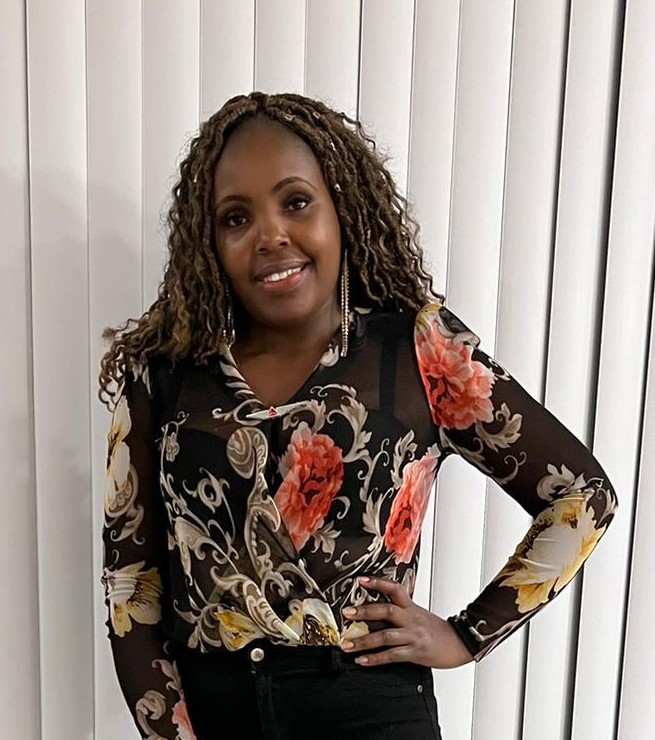
Esther Mwaniki is a bachelor’s in nursing science student and the Tornyay Center’s 2022-2023 Germaine Krysan Undergraduate Scholar. Her project is “Examining symptoms of post-intensive care syndrome in older intensive care unit survivors with end-stage renal disease”. Her faculty mentor is Dr. Maya Elias.
Why did you choose nursing?
My lifelong dream was to be a nurse. This was informed by my upbringing, observing my two aunts who were nurses in Kenya and a Tanzanian Registered Nurse I worked with in the US. For as long as I remember, I had always taken care of my six younger siblings and used to play nurse when they got hurt or sick. I was also the caretaker for my grandmother, who had a stroke and diabetes. Observing my aunt and the Tanzanian Registered Nurse at work illustrated to me the nursing role’s vast disciplines that span from advocacy, alleviation of suffering, diagnosis, treatment, and facilitation of healing of individuals, families, groups, and populations. I will demonstrate these lessons by being a nurse who advocates for her patients and provides quality care that will inspire another generation of new nurses to get into the field of nursing.
What’s your interest in healthy aging?
I love working with older patients. Taking care of older adult patients is a way of giving back, and I find pride when interacting with and caring for this patient population.
What’s your past experience working with older adults?
My grandma had diabetes, and my grandpa had asthma, and I used to care for them. I moved here to the US back in 2017, and the first year I was in an adult family home, basically a home with patients 65 and older. I used to take care of them, which was hard because, at that time, I was working with patients with dementia with little to no experience. I was always on my phone researching about dementia. It was tough because I didn’t know how to manage their behaviors.
I have taken an externship long-term care class, and my project was on behavioral management for older patients with dementia. I hope to learn a lot from the project to educate staff about how to manage and care for patients with dementia.
What’s your project with the de Tornyay Center?
My research project focuses on examining the differences in symptoms of post-intensive care syndrome (PICS) between older intensive care unit (ICU) survivors with end-stage renal disease (ESRD) and those without ESRD. PICS is an emerging problem that describes new impairments in cognitive, physical, and psychological function in older ICU survivors. The prevalence and risk factors are unclear in older ICU survivors with ESRD. Examining the differences between older ICU survivors with ESRD and those without ESRD will provide new knowledge to develop targeted nursing interventions.
Why is this research project important to do?
Social determinants of health for ESRD patients may include lack of education, employment, income, health literacy, access to health care, health insurance, housing stability, food security, and transportation. These socioeconomic factors may contribute to worsened critical illness severity among older ESRD patients. When older ICU survivors with ESRD are discharged from the hospital, they return to the same socioeconomic challenges, which may contribute to their high readmission and mortality rates after discharge. Clinical interventions to improve the quality of life in older ICU survivors with ESRD must acknowledge these social determinants of health, comorbid conditions, and socioeconomic challenges. Examining the differences between older ICU survivors with ESRD and those without ESRD will provide new knowledge to develop targeted interventions.
What are your plans after graduation?
My plans include mentoring and supporting nursing students while working clinically as a Registered Nurse (RN). After graduating with the BSN degree and earning state RN licensure, I plan to work in settings that serve large populations of older adults with severe and chronic conditions. My long-term goal is to apply for and enroll in the UW SON Doctor of Nursing Practice program to pursue my career as an Adult-Gerontology Primary Care Nurse Practitioner. As an Adult-Gerontology Primary Care Nurse Practitioner, I would be able to work in settings that serve large populations of older adults with severe and chronic conditions, such as primary care and internal medicine clinics; specialized clinics such as oncology, cardiology, and neurology; and skilled nursing/long-term care facilities. I also look forward to helping future nursing students achieve their academic goals, whether as an RN or ARNP preceptor and exploring opportunities to work as a UW SON clinical instructor in long-term care.
Is there anything else you’d like to share?
I’m grateful to have been one of the recipients of the Germaine Krysan Undergraduate Scholarship funds. These funds have helped reduce my financial burden by providing ample time to focus on my coursework, clinical hours, and honors program research opportunities. Undoubtedly, the scholarship has significantly helped me finish my BSN program successfully.